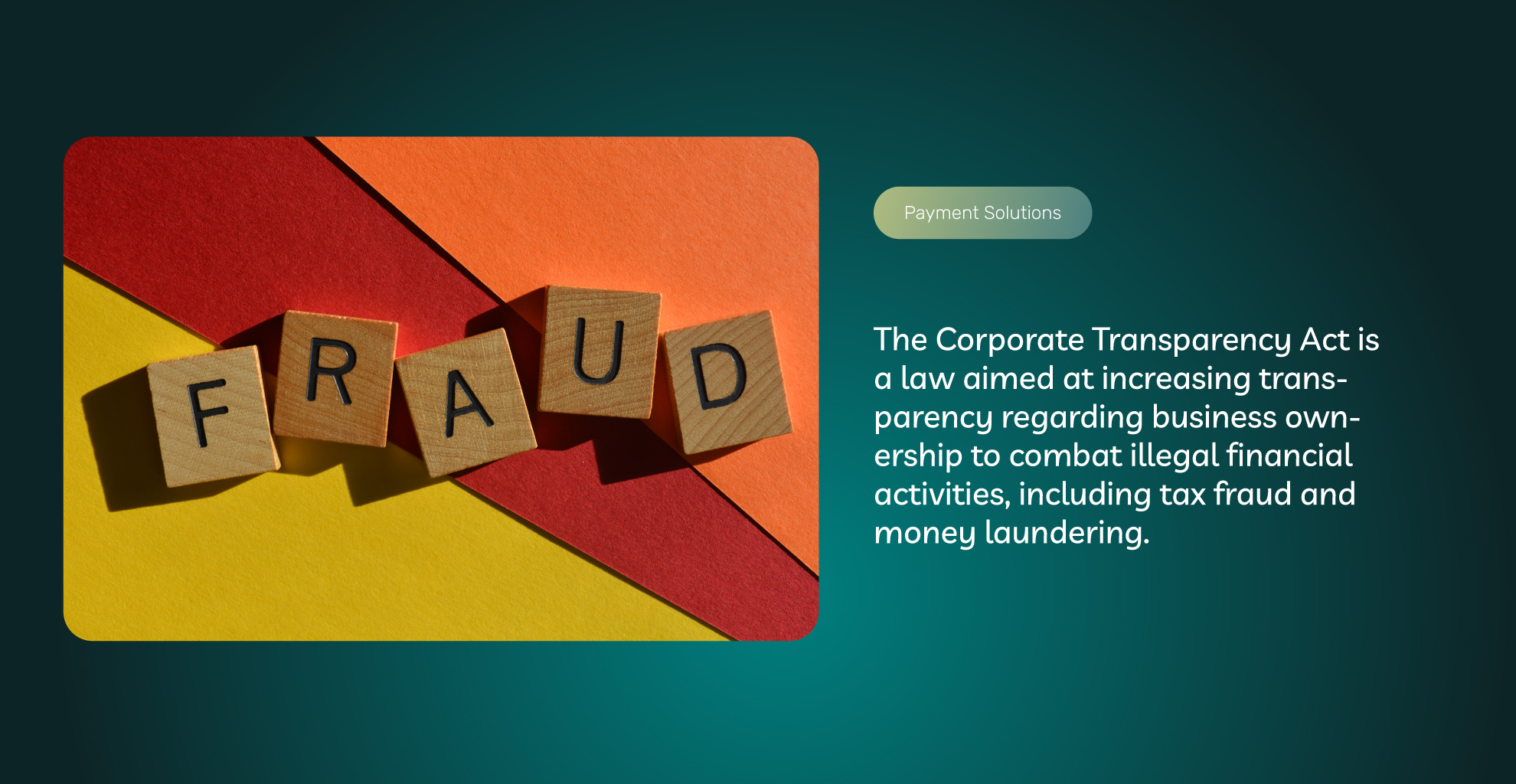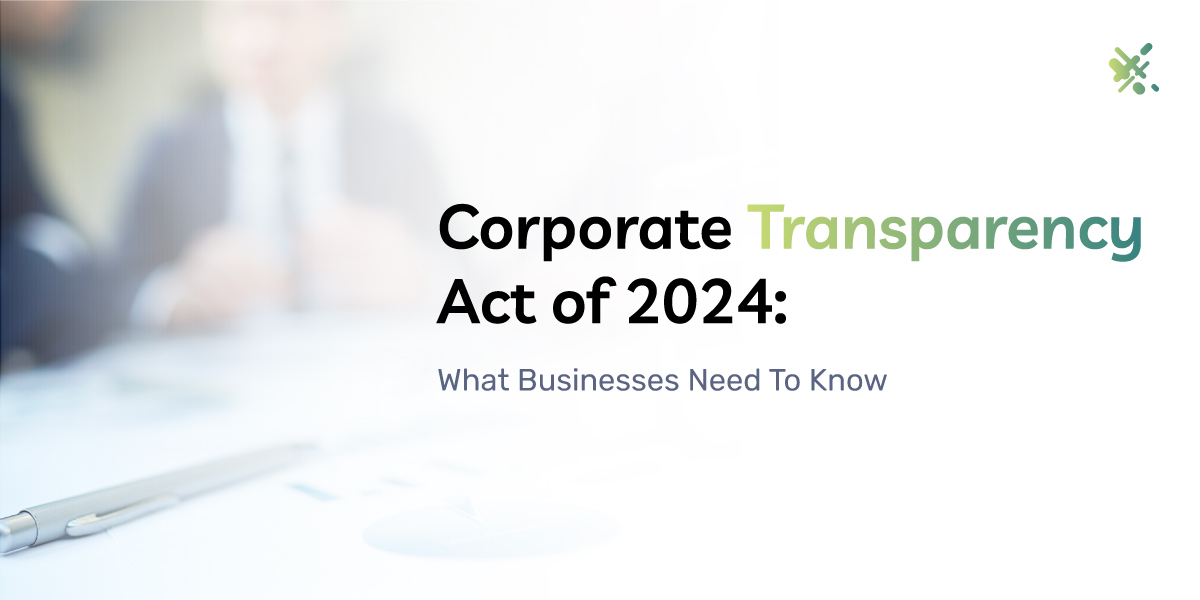The new year always brings new laws and regulations. Of course, 2024 is no different, and most businesses will have to deal with at least one new law or regulation. One new law that will impact businesses this year is the Corporate Transparency Act (CTA), which went into full effect on January 1, 2024.
As the name suggests, the new law regulations aim to increase transparency regarding the ownership and controlling interest in both large and small companies. With any new law, it’s essential to understand the requirements and the ramifications of non-compliance.
To help businesses navigate this new law, we have compiled the critical details regarding the law’s purpose, compliance, and penalties for non-compliance. We’ll also cover certain exemptions and how to take advantage of them.
If you own a business entity of any kind in 2024, keep reading to get the latest on the Corporate Transparency Act of 2024.
What Is The Corporate Transparency Act?
The U.S. Treasury and the Financial Crimes Enforcement Network (FinCEN) established the CTA to combat nefarious business activities, including money laundering and the financing of terrorist groups. The CTA is part of an overall financial transparency act initiative by FinCEN.
Beyond that, it can combat any type of illegal financial activity related to a business entity. Congress approved the U.S. Corporate Transparency Act (2021). The Corporate Transparency Act effective date begins on January 1, 2024.
This isn’t a new corporate transparency act. Instead, it finally went into effect in 2024 after its approval in 2021. The law designates any business that meets specific criteria as a “reporting company” and requires it to submit confidential beneficial ownership information (BOI).
This reporting criterion applies to all businesses operating in the United States and those foreign companies accessing markets within the United States or conducting business in the United States.
The U.S. Department of Treasury’s Financial Crimes Enforcement Network handles the enforcement of the 2024 Corporate Transparency Act. If the Reporting Company meets the requirements to file, it must submit all BOI reports to FinCEN.

Key Entity Definitions of The Corporate Transparency Act
The CTA uses new definitions that many small business owners may not be aware of. This can make it complicated to understand exactly what parts of the act you must comply with.
Below, we’ll outline the critical entity definitions to help you better understand the reporting requirements and how they apply to your business.
Existing Companies
The CTA differentiates business entities created before 2024 and those created after January 1, 2024. The CTA has no “grandfathering,” and all business entities must comply. However, the reporting deadline is different depending on the creation date of the business entity.
The CTA defines existing companies as business entities registered before January 1, 2024. Entities such as LLCs, corporations, or any entity required to register with the Secretary of State’s office in its jurisdiction must comply with this requirement.
For Existing Companies, they must report by January 1, 2025. So, they have exactly one year to comply with the new reporting requirements under the CTA.
New Reporting Company
The CTA defines a new reporting company as any entity that registered or was created between January 1, 2024, and January 1, 2025.
Similarly to existing companies, this includes any LLC, corporation, or other entity that must register with the Secretary of State or other agency within their state or jurisdiction of formation.
Suppose your business entity falls under the definition of a new reporting company. In that case, you must file your beneficial ownership information report within 90 days of receiving notification of your entity’s creation or registration documents.
The 90-day reporting begins when any private or public notice of the creation of your entity is received. For example, if an official state website posts the creation of your entity before you receive your documents, the start date is when the website publicly announces the notice.
If your notification of your business entity creation was via a letter or email, the 90 days begins when you receive the message.
Reporting Companies Created After January 1, 2025
For all business entities created on or after January 1, 2025, you will have 30 days to file your beneficial owner’s information report with FinCEN.
Determining Who Is A Beneficial Owner
As a business owner, you’re likely wondering what a beneficial owner is. FinCEN provides a complete description, but we’ve provided a summary below.
The Corporate Transparency Act defines a beneficial owner as anyone who directly or indirectly controls the reporting company.
Beneficial Ownership Rules 2024
Senior officers: The president, CFO, or CEO are examples of senior officers. This also includes any position that performs similar functions regardless of their title.
Authority to appoint officers: A beneficial owner can appoint or remove officers from the reporting company.
Decision-maker: The CTA considers an individual primarily responsible for critical decision-making a beneficial owner.
Other forms of control: Essentially any other individual, regardless of title, that exercises control over the reporting company
Furthermore, a beneficial owner is anyone with an ownership interest of 25% or more in the reporting company.
An ownership interest can include actual ownership via an agreement. But it can also include stock ownership, equity, or voting rights within the company. Essentially, any mechanism to exercise ownership qualifies in this case.
Some individuals may qualify for exemptions in regards to being a beneficial owner. For example, accountants and lawyers generally do not qualify as beneficial owners. However, they may depend on the exact nature of their work within the reporting company.
Overall, FinCEN recognizes five total exemptions when it comes to an exemption from the beneficial ownership determination.
1. Minor
Any minor child, as deemed by the state law, has an exception and is not included as a beneficial owner.
However, when the child reaches the age of majority in the state, the reporting company must update their BOI within 30 days of their birthday. The reporting company then must include the person’s entire identity and information.
2. Nominee/intermediary/custodian
This is where most tax professionals or accountants would be exempt. In most cases, acting as an agent for the beneficial owners does not qualify as a beneficial owner.
FinCEN documents use the term “arm’s length” when describing exempt professional services. So, it’s possible that agents or intermediaries with more direct control or authority may not be exempt.

3. Employees
Generally, reporting companies will not list employees as beneficial owners. However, the employee needs to meet all three of the following criteria.
- The employee is subject to the employer’s will, and the employer controls how and when the employee performs their work. The employer also has the power to terminate the employee.
- The employee’s economic benefit comes solely from their employment status.
- The individual is not a senior officer of the reporting company.
If the employee meets all three criteria mentioned above, they are likely exempt from being a beneficial owner.
4. Inheritor
If a person’s only interest is via an inheritance in the future, then they would not qualify as a beneficial owner. If they take a controlling interest in the reporting company at the time of inheritance, then the BOI would need to be updated with their information.
5. Creditor
In this case, a creditor would be someone who would assume the right or interest in the reporting company via a debt incurred or a loan agreement. That must be the only way the creditor would be interested in the reporting company.
If the creditor has an additional interest in the company through a non-exempt method, they must be listed on the BOI.
What If My Beneficial Ownership Information Changes?
Suppose your business entity undergoes any type of change that impacts the accuracy of the BOI you previously submitted. In that case, you must file update reports (BOI) with FinCEN within 30 days of the change.
If you notice an inaccuracy with your original BOI filing, the same conditions apply, and you have 30 days to update your information. The 30 days start from the date that you became aware of the inaccuracy.
One final note is that your BOI filing with FinCEN is a one-time event, and you do not need to file every year on any other type of recurring schedule. You would only need to refile if your BOI information changes after you originally submitted it.
What Companies Are Exempt From The Corporate Transparency Act Requirements?
The designers of the CTA mainly focused on addressing smaller business entities that functioned as “shells” or front companies for nefarious activity when creating the CTA. This means that larger corporations already in good standing in the United States are mostly exempt.
Overall, there are a total of 23 types of entities that are exempt from CTA reporting requirements. Below are the primary entity features covering most of the 23 except entities.
Large U.S. Operating Companies
Large operating companies, as defined by the CTA, are exempt from CTA reporting requirements.
An entity with 20 or more full-time United States employees is defined as a large operating company. These must be direct employees of the entity in question and not employees of any affiliated entity.
To qualify as a large operating company, you must also have over $5 million in U.S.-based revenue based on your previous year’s IRS tax filings.
Finally, you must also have a physical business location within the United States. This must be a physical location, not a P.O. box or other non-permanent mailing address.
Publicly Traded Entities
If your publicly traded business has outstanding securities, it is likely exempt from CTA reporting requirements. There are some rare circumstances where this may not be the case. However, the majority of publicly traded entities are exempt from the CTA.
Tax Exempt Entities
If your entity holds tax-exempt status, it likely qualifies for an exemption from CTA filing requirements.
Certain Pooled Investments
Recognized and licensed professionals administering most pooled investment vehicles are exempt from CTA requirements. There are certain situations where this may not apply, especially with complex investment vehicles.
Investment vehicles administered by broker-dealers or licensed financial advisors are generally exempt.
Below is the list of 23 entities exempt from CTA reporting.
- Securities reporting issuers
- Governmental authorities
- Banks
- Credit unions
- Depository institution-holding companies
- Money service businesses
- Brokers or dealers
- Securities exchanges or clearing agencies
- Other entities required to register under the Exchange Act
- Registered investment companies and registered investment advisers
- Venture capital fund advisers
- Insurance companies
- U.S – state licensed insurance producers
- Commodity Exchange Act registered entities
- Registered public accounting firms
- Regulated public utilities
- Financial market utilities
- Pooled investment vehicles (covered above)
- Certain tax-exempt entities under the Internal Revenue Code (covered above)
- U.S. entities assisting a tax-exempt entity
- Certain large operating companies (covered above)
- Subsidiaries of certain exempt entities
- Certain inactive entities
Most of the exemptions are relatively self-explanatory, and you should be able to decide if you fall under one of them. However, some are more complex, especially if they involve affiliate entities under the primary entity that is reporting.
In these cases, you should consult an accountant or legal professional specializing in FinCEN-related filing and compliance.+


Who Can View My BOI Report?
Many business owners are curious about who can view the BOI report and whether or not it becomes publicly available after they submit it since the report contains personal information.
BOI reports, and all information within the reports are not available to the public and are not searchable by the public. They also do not become part of any public database.
FinCEN holds BOI reports and only provides them upon request to law enforcement agencies or intelligence agencies that follow the proper channels outlined in the final CTA language.
Financial institutions can also request access to BOI reports from FinCEN to comply with specific reporting requirements under the law.
Corporate Transparency Act-How To File
Most business owners are likely not familiar with a beneficial owner information report. This also means they likely don’t know what information to include. Once you’ve determined that you’re a qualifying reporting business and have identified your beneficial owners, you must include the proper information for complete Corporate Transparency Act reporting.
Regardless of the creation data, all reporting companies need to include the following information for beneficial owners.
- Legal name
- Physical address
- Birthday
- Identification (state driver’s license number or passport ID)
- State or jurisdiction where the entity was created
You must include all beneficial owners and applicants for businesses created after January 1, 2024. Not every business will have applicants to include. If the business registered after January 1, 2024, include these additional applicants.
Reporting companies created before that date do not need to include any applicant information. If your company has a FinCEN ID for a beneficial owner, you can use that information instead of the other required details. In the next section, we’ll explain what a FinCEN ID is and how to obtain one.
If the business is based in the United States, use the address of the business headquarters or central location for the address. Off-shore companies must use the address of a physical U.S. location where they conduct business.
Remember to communicate any changes to your home address or business address to FinCEN within 30 days of the change. If you move or change your primary residence, you must update the BOI accordingly. The same applies if any new partners or individuals enter your business. If they meet the broad criteria for beneficial owners and are not exempt in any way, you need to update your BOI within 30 days.
Starting on January 1, 2024, if you make a significant change to your business structure, you must consider how it impacts your previous BOI report and filing to ensure nothing has changed.
Using A FinCEN ID When Submitting Your BOI Report
A FinCEN ID is a free and unique identifying number assigned to individuals by FinCEN and the Department of the Treasury.
You do not need a FinCEN ID. A FinCEN ID is also not required to file a beneficial ownership report. However, the unique number does make it easier for certain business filings related to FinCEN.
If you or a beneficial owner already have a FinCEN ID or apply for one, you can use that information instead of the other required information.
You can obtain FinCEN IDs for free by applying online on the FinCEN website.
Can I Fill Out And Submit The BOI Report Myself?
In most cases, you can complete the required forms for taxes or other business-related filings.
You can also complete and submit the Corporate Transparency Act form without professional assistance.
However, since the BOI report does have legal implications, you should consider contacting a legal or accounting professional with experience in FinCEN-related filings. This is especially true if you operate a complex business entity where it’s challenging to determine precisely who is a beneficial owner and who is exempt.
You can file the report yourself if you run a simple business with only one owner. But even in this case, a short consultation with a professional is a good idea, considering this is a new filing requirement.
FinCEN makes the BOI report e-filing forms available for free on their website, and there is no charge or fee to submit the form or use the system.
You can also access a PDF and fill the form out offline using Adobe Acrobat Reader or similar PDF software.
If you’re a third-party service provider, you can request access to the FinCEN API to make submissions easier for you and your clients. A FinCEN representative will contact you for API access to begin the process.
Overall, considering the BOI report only needs to be submitted once per company, it’s worth consulting with a professional during the submission process. Many LLC preparation service providers will likely include this service moving forward now that it has become required.
Does The Corporate Transparency Act Create New Laws For LLC In 2024
Regardless of the type of business entity you are creating after January 1, 2024, the process does not change because of the new CTA requirements.
The CTA and BOI report are simply additional filing requirements for 2024 corporate entities and the filings you are already required to make. It does not change the initial registration process at all.
LLC Changes:2024
The process is the same if you are creating an LLC or filing an incorporation document with a Secretary of State’s office. The difference is you will need to determine if you qualify as a reporting company and who the beneficial owners are.
If no exemptions apply, you must file a BOI report within 30 days of forming the LLC. You’ll also need to update the BOI should anything change about your beneficial owners or their information.
What Are The Penalties If I Don’t Comply With The Corporate Transparency Act?
Non-compliance with the CTA carries both civil and criminal penalties. Those found to have willfully refused to comply with CTA requirements can face up to a $500 civil fine. Each day the violation continues, authorities can levy this fine on a per-day basis.
Possible criminal penalties include up to two years imprisonment and a fine of $10,000.
Key Corporate Transparency Act Definitions To Know & Summary
Reporting Company
A reporting company is a domestic or even foreign business entity that does not meet any of the exemption criteria within the CTA. The CTA defines a reporting company as an entity that must submit a beneficial owner information report.
Any entity formed in the U.S. that registers with a Secretary of State or similar office can be considered a domestic reporting company. Any foreign company registered to do business in the U.S. is regarded as a foreign reporting company.
Beneficial Owner Report (BOI)
A BOI is a form submitted by reporting companies that contain the identity of all beneficial owners of the reporting company.
Beneficial Owner
A beneficial owner controls at least 25% of a reporting company. A beneficial owner can also exert specific controlling authority over the reporting company.
This control can be assigning officers, removing officers, or other key decision-making processes within the reporting company.
Company Applicant: Corporate Transparency Act
For reporting purposes, applicants are those who submitted or guided the process of creating the business entity.
Companies created after January 1, 2024, must list these applicants in the BOI report. Reporting companies created before that date do not need to include applicant information.
Applicants will generally be lawyers or accountants who handle the creation of a business entity for the beneficial owners of a reporting company. The applicant can be any individual who serves this purpose.

FinCEN ID
A FinCEN ID is a free ID number a beneficial owner can apply for via the FinCEN website. Instead of supplying the personal information required within a BOI report, you can use this ID.
A FinCEN ID is not required, and applying for one is voluntary. However, it can make reporting and other compliance issues easier when dealing with FinCEN documentation.
Public Companies
Public companies are those with outstanding equities traded on U.S. exchanges.They are exempt from CTA filing requirements.
However, subsidiaries and affiliates of public companies are likely not exempt. In total, there are 23 exemptions from CTA filing requirements (see list above).
LLC January:2024
LLCs created after January 1, 2024, will not change. However, the government Transparency Act will require that you determine if the LLC formed under the law is a reporting company. If it is, you must determine the beneficial owners of the corporation/limited liability company.
Corporate Transparency Act Summary & Final Thoughts
Business owners rarely welcome new regulations, especially when they add extra filing requirements on top of what is already in place. However, the requirements of the CTA will not be too complex to comply with for most small businesses.
The BOI report only needs to be submitted once, so businesses shouldn’t experience an undue hardship filing it. There are also convenient ways for filing, such as online or using the supplied PDF form to fill out offline before submission.
Finally, as with all legal requirements regarding your business, you must contact a qualified tax or accounting professional if you have any questions about the Corporate Transparency Act or your BOI report.
Frequently Asked Questions Regarding The Corporate Transparency Act of 2024
Effective on January 1, 2021, the Corporate Transparency Act is a law aimed at increasing transparency regarding business ownership to combat illegal financial activities, including tax fraud and money laundering. On January 1, 2024, it added new reporting requirements that require millions of businesses to file a Beneficial Ownership Information Report with the U.S. Department of Treasury’s Financial Crimes Enforcement Network.
All businesses registered with the state legislature are subject to the Corporate Transparency Act. If your business meets specific criteria, you will be a “reporting company” and will be required to submit confidential beneficial ownership information (BOI) to the Financial Crimes Enforcement Network (FinCEN).
•Businesses registered before January 1, 2024, must report by January 1, 2025.
•Businesses created between January 1, 2024, and January 1, 2025, have 90 days from the receipt of creation notification.
•Businesses created after January 1, 2025, have 30 days to file.
Beneficial owners have at least 25% ownership over the reporting company. However, there are five total exemptions FinCEN recognizes, including:
1. minors
2. nominee/intermediary/custodian roles
3. employees meeting specific criteria
4. inheritors with future interests
5. creditors with interest through a debt or loan agreement
Any changes that impact the accuracy of the Beneficial Ownership Information (BOI) must be reported to FinCEN within 30 days of the change, including updates due to inaccuracies in the original filing.
